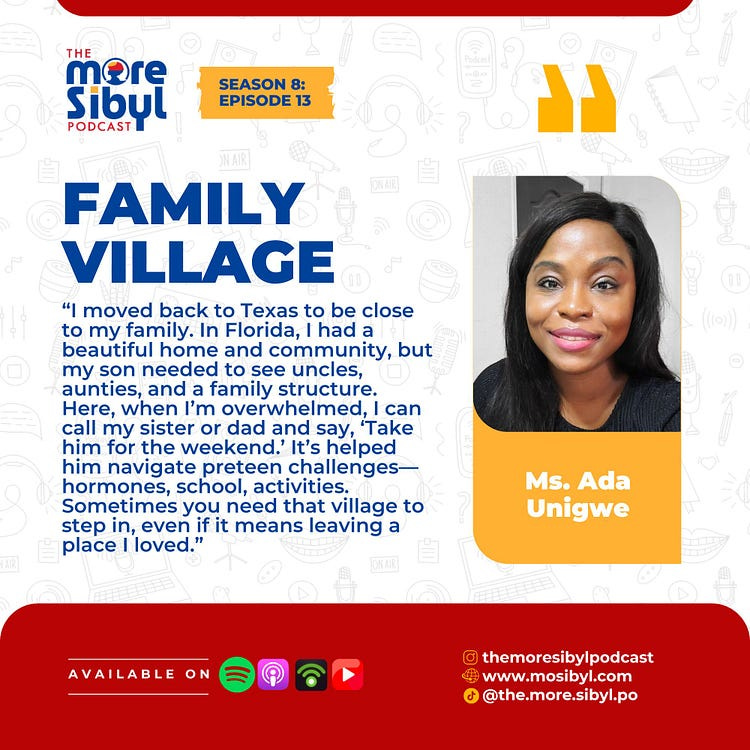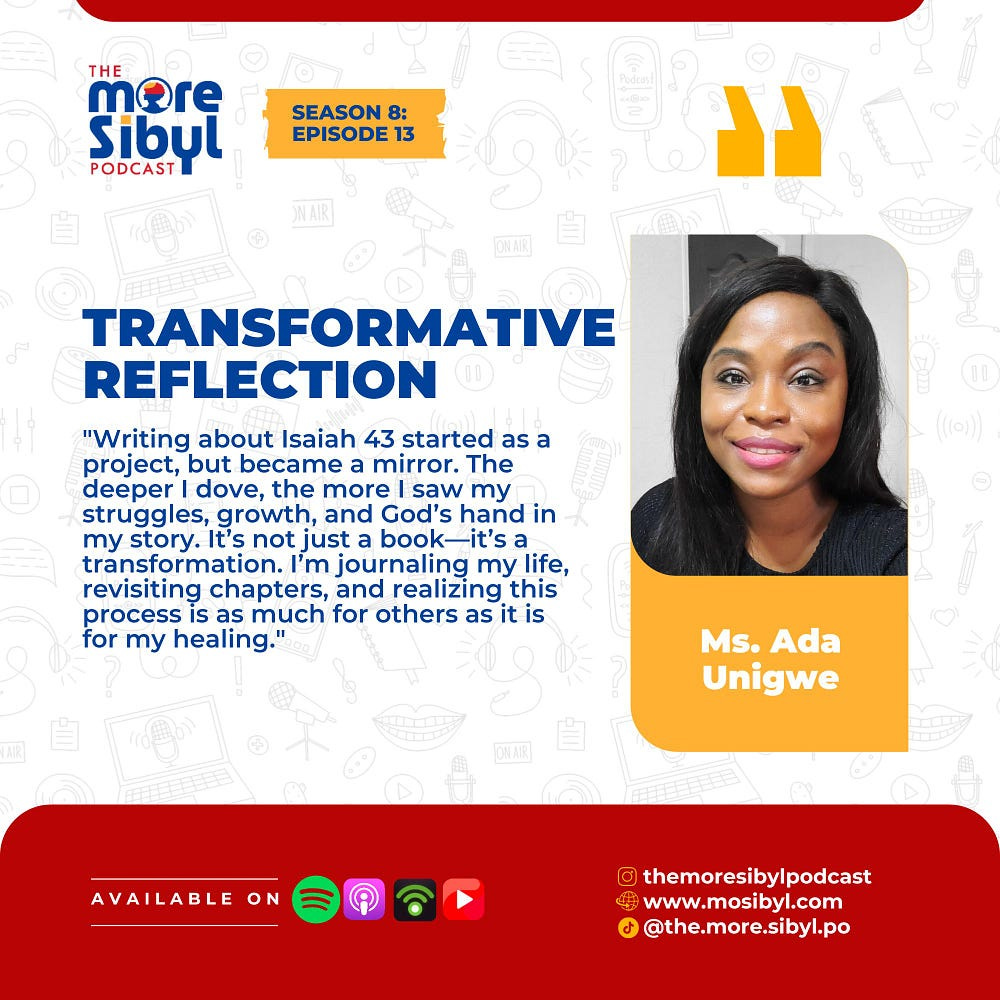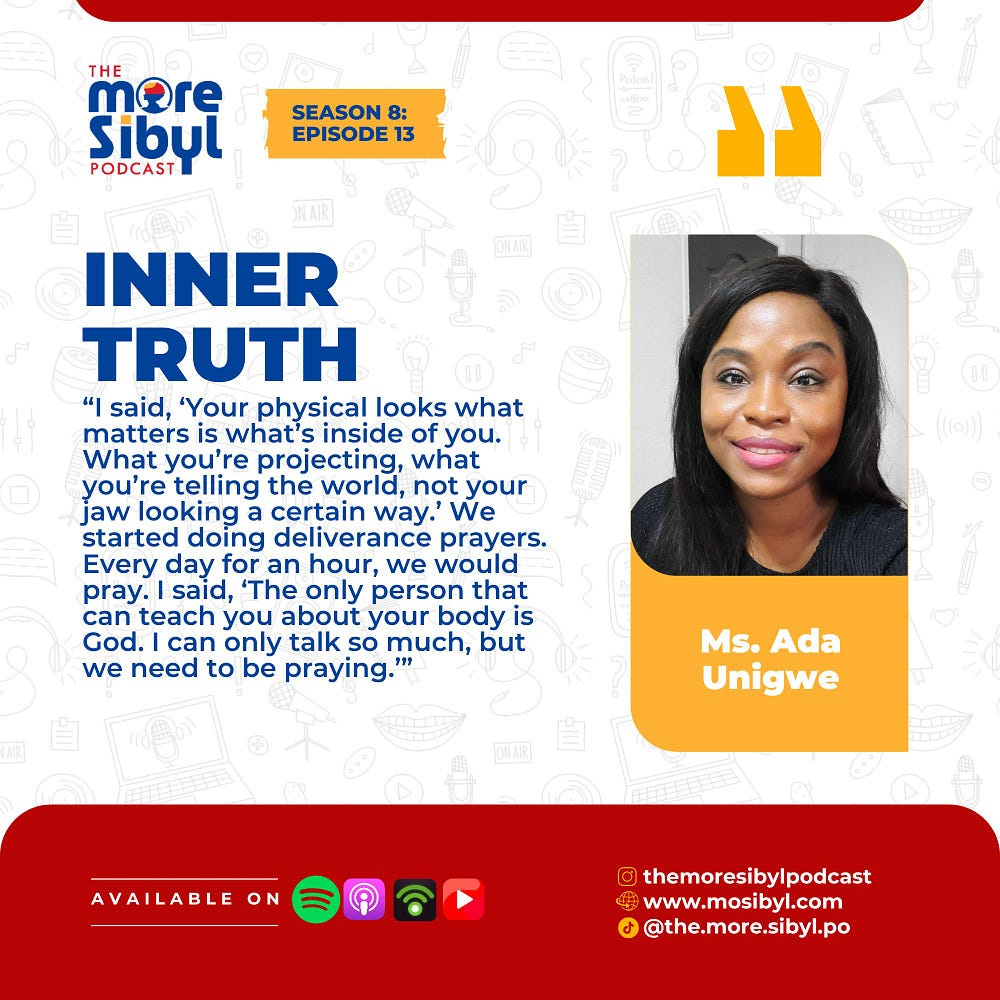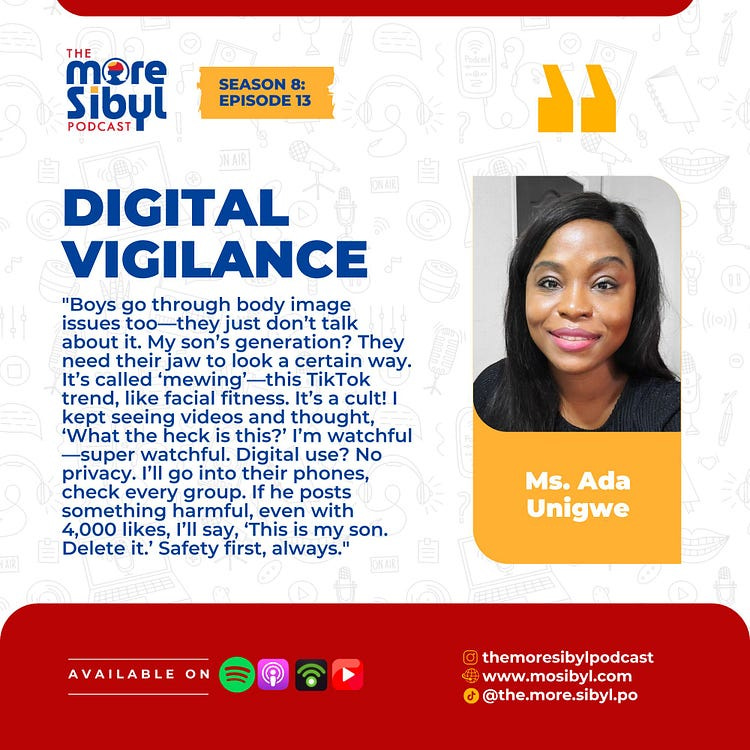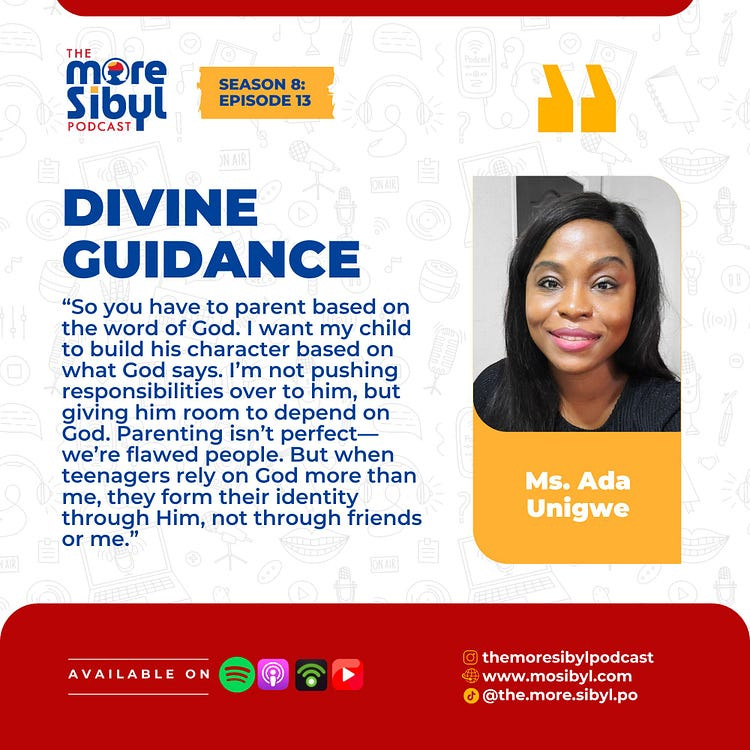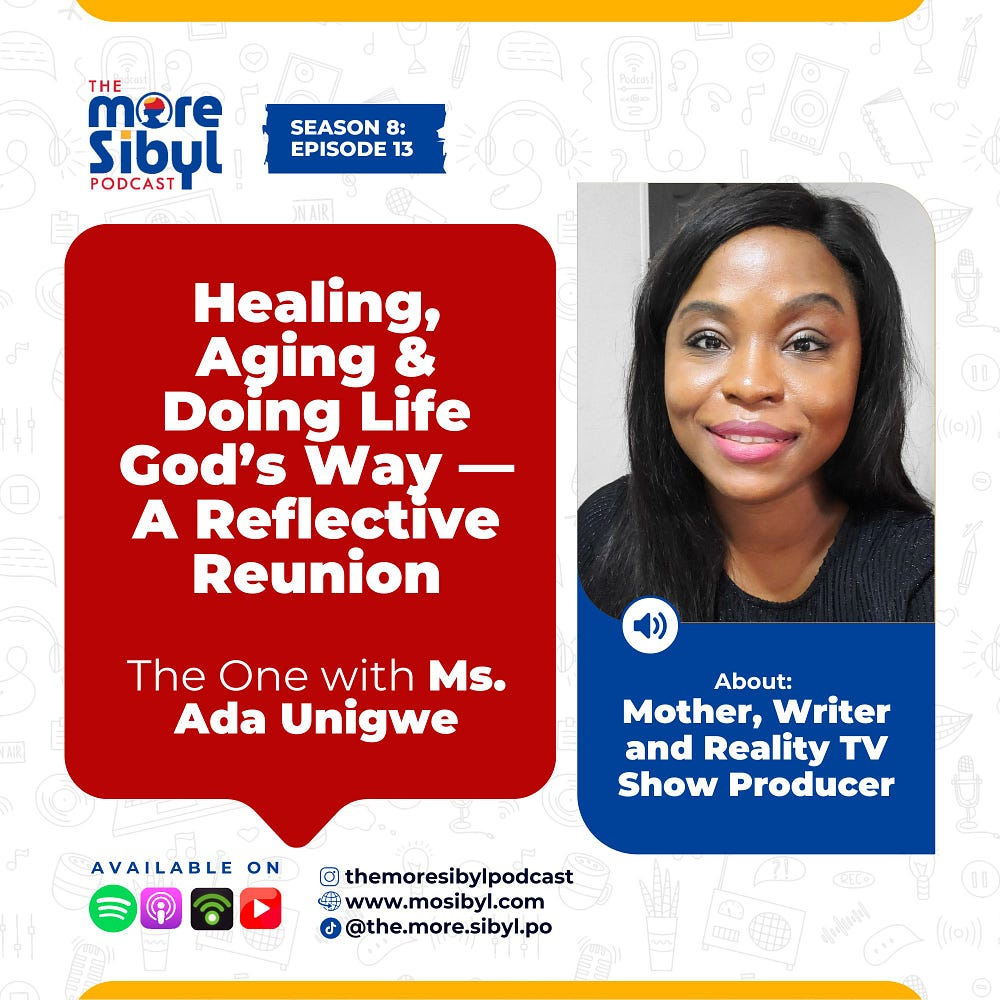Healing, Growth, Aging, and Living Life God’s Way After Divorce
다시 피어나다| A Reflective Reunion with Ada Unigwe | Episode 13 (2025)
“Florida was comfortable — too comfortable. I’d wake up to lakes and calm, and I stopped hustling. But comfort can make you stagnant. Moving back to Texas reignited my drive. Yes, there are bumps in the road — times I ask, ‘Why me?’ — but I focus on blessings. My kids’ relationships with family, my job stability… gratitude keeps me grounded.” — Ada (2025)
The podcast is back with another special blast from the past, featuring Ms. Ada Unigwe, who first joined us seven years ago during our very first season. In her debut episode, she shared her journey: growing up in Nigeria, migrating to the US, joining the military, surviving divorce, and navigating life as a single mom raising multicultural kids. (You can find that episode here:“Life of a Woman”). Ada left us with powerful lessons on resilience, vulnerability, and the underrated magic of ice cream therapy. Needless to say, we’re thrilled to have her back.
Rebuilding the Village
Our first stop is revisiting how Ada has navigated raising her kids as a single mother and how life has unfolded over the past seven years. At the time of her last appearance, she was living in Austin but later moved to Florida for work. During the COVID-19 pandemic, she seized the opportunity to return to Texas, closer to her family — a move she saw as essential for helping her children build stronger connections with their extended relatives. “This way,” she explained, “I would get more help from my family and just have them see what an extended family looks like and how we get along.” Of course, there were other perks, such as casually sending the kids off to their aunts' and uncles’ for the weekend, and receiving much-needed parenting advice.
What stood out to me was the contrast between raising children in Nigeria versus the U.S. They say it takes a village to raise a child, and in Nigeria, that village shows up whether you ask for it or not. There’s always an aunty or uncle ready to step in before your parents even get back from work. It’s a different story in the U.S., but Ada’s decisions demonstrate just how intentional she has been about creating that same sense of community around her.
Another reason Ada shared for moving back to Texas was the unsettling feeling of getting too comfortable. Quiet mornings spent staring at the lake in her backyard made her forget all about the hustle. “I wasn’t even chasing any dreams… I was too relaxed,” she admitted.
Since returning to Texas, she says she’s become more creative, which, she noted with a laugh, feels ironic. “You would think the calm scenery in Florida would make me more creative, but no… I was literally watching my life just slip by.”
Back in Texas, she’s been learning, growing, and taking on more projects — including writing several books on cybersecurity, scripts, and what she describes as a “journal of her life,” inspired by Isaiah 43. It’s truly exciting to see her stepping into this new season with so much energy and momentum.
Staying Young at Heart: Redefining Youth Beyond the Surface
Seven years is not a joke, and if you're at a certain age (do the math), you cannot avoid facing the reality of getting older, including white hair, sagging skin, and all that comes with it. While we discussed the existential crisis of aging, Ada said something that resonated with me: “It takes the word of God for you to accept that you are actually on a journey,” referring to her current journaling project and how it has blessed her more than she initially thought. For her, especially as a single woman, that journey includes navigating self-esteem, singleness, and the realities of aging.
She got real about the dating pool and even joked, “If I’m going to eat the frog, let me eat the one that has the most eggs and is looking the most younger.” But underneath the humor was a more profound insight — it’s not about looks, it’s about energy.
What fades with age, she said, isn’t just your physical appearance — it’s your spark. And that’s what she’s committed to maintaining: a youthful mindset, creativity, and her unique perspective on life. “If you’re looking old and thinking old… It’s not going to work,” she told me. Ada’s choosing to age with intention — and keep that inner spark alive.
When Life Doesn’t Go as Planned: Learning to Adapt Along the Journey
When I asked Ada what’s changed the most in the last seven years, her answer went deeper than I expected. She began by describing how her perception of life has shifted — from clinging to expectations to learning how to adapt. “I always had what I thought would happen,” she said. “Versus what actually happened.”
Like many of us, she used to plan her future based on what she knew at the time. But over the years, through job changes, moving, watching her kids grow, and growing herself, she realized how little we actually know about what’s ahead. “We think we know,” she said. “We’re so sure.” But life has its own curveballs.
One of those curveballs for Ada was hormonal. She opened up about entering the premenopausal phase, something she never expected to face so soon, and something she rarely heard women talk about openly. “I would get so tired that sometimes I wouldn’t even be able to leave my bed,” she shared. “I just felt like somebody beat me.” She talked about sleep issues, body aches, and the shock of realizing her body was changing in ways she couldn’t control. “You can manage the symptoms,” she said, “but you may not be able to control how your body’s going to react.”
But the changes weren’t just physical. Ada said she also matured mentally, becoming more intentional about seeking meaningful relationships, both personal and professional. “You need more people,” she said. “Not necessarily to succeed, but just to live.” That shift toward connection and community felt like one of the most significant transformations of all.
Parenting Beyond Stereotypes
Still discussing how she’s changed over the years, we talk about how she has become more patient, especially with her children. She shared how her son began to seek connection through cultural cues. He had started watching exaggerated parodies of “angry African moms” on YouTube, and while it might seem funny at first glance, Ada realized he was trying to understand her through that lens. In his mind, her occasional yelling wasn’t just about frustration — it was “because she’s African.” That struck a chord with her. She didn’t want him internalizing that stereotype or projecting it onto other African women in the future.
So she began doing the work, explaining that her reactions weren’t cultural defaults but human responses, sometimes shaped by stress, emotion, or being asked to repeat herself multiple times. She emphasized that parenting wasn’t about fitting into a mold, but about raising kids in truth and grace. For her, that meant anchoring everything in the word of God. She prayed over her children, taught them to turn to God even when she fell short, and made space for them to see that even parents need guidance.
Ada even encouraged her son to “report her to God,” to lean on his faith rather than just her authority. They’d sit together, Bibles open, sometimes asking him to preach a mini-sermon in their living room. She wanted him to know his identity wasn’t rooted in her but in something greater.
And then there was her daughter — more compliant, easier to parent, and, in her words, “almost perfect.” That contrast taught her a beautiful lesson: parenting isn’t a one-size-fits-all job. What can feel like opposition is often just individuality, and when we shift our perspective, we start to appreciate that uniqueness. Ada’s story reminded me that parenting really is about growing alongside your children — learning, stretching, praying, and trusting that God is shaping them in ways we can’t always see.
Learning to Trust the Process When Memory Fades
One of the things I deeply respect about Ada is her openness and self-awareness about her mental health journey. During our conversation, she shared how her experience with memory loss, possibly linked to trauma, made her afraid she might forget her own life.
At one point, she couldn’t even remember things her boss said just an hour earlier. It got so bad that she began taking photos with date stamps, to piece her life together later. “In case I can look at that date and remember what happened there,” she said. That hit me. It’s something so many of us take for granted — being able to trace the threads of our days. But for her, even that became uncertain.
She spoke about being in meetings where she’d cry or get angry out of frustration. And through all of that, what grounded her was her faith. She described how God reminded her to “be anxious for nothing” and to stop obsessing over what was lost. Instead, she learned to trust the process and focus on what she could remember — on gratitude. “I’m thankful I’m here,” she told me. “I may not remember a lot of this conversation later, but I’m thankful that I’m here.”
During our conversation, she shared how her experience with memory loss, possibly linked to trauma, made her afraid she might forget her own life.
That shift in mindset sparked something in her: a sense of urgency. She started writing books, creating shows — not just for the present, but to leave a legacy. Because, as she said, “If one day, God forbid, this gets progressively worse… I want to know I left something behind.”
It was powerful hearing her reflect on how that awareness changed the way she parents too. She’s more intentional with her words, knowing her kids may remember things she won’t. “I may say something out of anger,” she admitted, “and I won’t remember it, but they will.” That honesty floored me.
And I couldn’t help but chime in at that point — because I’ve been there too. Parenting from a place of fear, worried I might mess things up. But I shared something my friend Doc Ayomide, who is a psychiatrist, once told me: trauma isn’t always as immediate or permanent as we fear. There’s grace in self-awareness. Grace in course correction. And even in just having these conversations.
Ada might not give herself enough credit, but I will. She’s doing the hard work of showing up with humility, honesty, and heart. And that matters more than she knows.
Raising Emotionally Healthy Kids in a Digitally Pressured World
One of the things Ada shared that really stuck with me was how intentionally she’s created a space in her home where her kids feel safe expressing themselves. She said she has learned to really listen to her children, not just nodding and moving on, but listening in a way that invites honest feedback. Sometimes, she even has them write letters about things they wish they could change — whether it’s about themselves, their family dynamics, or even her parenting style. That kind of openness? That’s rare. And it’s powerful.
I was especially moved when she shared a conversation with her daughter about height. Her daughter once said, “I wish you were taller because that means I’m going to be short.” Instead of brushing it off, Ada took it seriously, first by affirming that her height doesn't have to change anything about who she is and what she can achieve. Secondly, she bought her vitamins, which supposedly help with growth (pricey ones, too!), and made her feel heard. Later on, her daughter excitedly claimed she’d grown taller, pointing to a mark on the wall. Ada, knowing it was probably just a new hairstyle, chose not to burst that bubble.
She kept saying, “If it’s helping you feel better, no problem,” but paired it with deeper conversations like: “You can’t change your height, but you can change how you see it.” That balance of affirmation and grounding? That’s parenting magic.
And this openness extended to conversations with her son as well. Ada noticed him spending more time with her hair products, grooming with intention, and becoming increasingly concerned with his appearance. After some investigation, she realized he’d been watching videos about mewing — a trend claiming to reshape your jawline. That revelation hit hard. She immediately began discussing with him what truly defines a person. They even launched a 21-day prayer challenge, focusing on scriptures related to identity and confidence. She said something I won’t forget: “The only person who can teach you about your body is God.”
Ada is also unapologetically involved in her kids’ digital lives. She monitors their phones, checks their group chats, and has every password. When her son posted a comment online that got over 4,000 likes — but wasn’t kind — she didn’t let it slide. She commented right under his post, letting the world know: “This is a 14-year-old kid and I’m his mom.” That’s the kind of visibility and presence that makes a difference.
And beyond the home, she’s looping in coaches and teachers, sending them emails when her son misbehaves, so there’s accountability outside the house, too. When he called a teacher a disrespectful name, she pretended to draft an email to the teacher to make him reflect on his words. It worked. It was a lesson in humility and recognizing the people invested in your growth. Here’s the lesson she wanted to drive home: “If you look down on those who are trying to help you succeed, what’s going to happen is you’re going to cut off your ability to learn from them.”
Ada’s approach isn’t about controlling her kids — it’s about equipping them. It’s about building emotional muscles, giving them vocabulary for their insecurities, and letting them know they’re not walking through adolescence alone. She’s doing the work most of us are still learning to prioritize. Sometimes, we have to do things that our kids disagree with and we have to know that it’s okay. She shared that from that experience with he teacher, she asked her son to read the book, “Crucial Conversations”. Even though he was mad at her, he still read it. “I want him to understand what he did wrong and why he’s being punished.”
Another practice that stood out to me was how Ada always asks her kids the hard questions. “Tell me about yourself, pretend you’re a parent, what do you want your children to know?” These are questions that even many adults do not know how to answer; yet, because of Ada’s intentionality, the seeds of thoughtfulness and awareness are being planted in her children’s lives at such a young age, and that is truly commendable.
Redefining Legacy Through Alignment with God’s Will
When I asked Ada what kind of legacy she hopes to leave behind, her answer wasn’t wrapped in the usual talk of accolades or accomplishments. Instead, she shared something much deeper — something rooted in purpose and obedience. She said she desires to live a life that’s completely aligned with God’s will, not based on her own standards or anyone else’s expectations. It struck me because that kind of clarity takes serious soul-searching.
For Ada, legacy isn’t necessarily about something grand or globally recognized. It might show up in her writing, in TV production, or even in something as personal and quiet as making sure her daughter reads the Bible. She’s not measuring impact by numbers, fame, or visibility. She’s measuring it by obedience and alignment.
Fulfillment, for her, isn’t about making people proud — not her parents, not even herself. It’s not about being remembered as someone great. It’s about following God’s plan for her life, for however long she’s here. That’s it. That’s the mark of success for her. And honestly, that perspective — where legacy and fulfillment are both grounded in divine alignment rather than worldly achievement — was a refreshing and humbling reminder.
Learning to Let Love Be Led by God
As someone who has been through divorce, I was curious to know how her journey was going, especially her healing and trust. She described it as nothing short of a rollercoaster. There were seasons where she felt a deep desire to settle down again, mainly so her kids could have a father figure in their lives. But eventually, she had to confront the real reason behind that desire — and she realized it was more about filling a gap than following God’s plan for her life.
That moment of clarity led her to step back and reevaluate everything. Through reading scripture, she was reminded of how God identifies as “a father to the fatherless,” and she started leaning into that truth. Trusting God in that area wasn’t easy, but it became necessary.
These days, Ada told me she hasn’t really dated, and it’s just not at the top of her list. Not because she doesn’t believe in love — she’s all for happy relationships and marriage — but she’s not in that space right now, and she’s completely at peace with that. She even gave online dating a try again at one point, but it didn’t sit right with her. “I ran back out,” she said. “This is not for me.”
What stood out to me most was her clarity and surrender. She’s allowing God to lead, and she’s okay with wherever that path takes her. Like we both agreed, what’s worse than not having someone is having the wrong person. Ada’s learned that deeply, and her peace is evident.
Creating Space for Single Mothers and Shattering Shame
Finally, I asked the star question of this reunion series: What kinds of conversations does she believe we should be having more of on the podcast? Her answer was immediate: she would love to hear more about African single moms in the diaspora. It’s not a topic that receives a lot of attention, but for Ada, it’s personal and urgent.
She pointed out that many women are struggling silently out here. And when you finally hear their stories, you’re stunned. Often, the first thought is, “But there are so many resources!” And yet, so many of these women don’t know what’s available to them. Ada’s passion lies in making those resources known and accessible. Because, as she put it, when the mom is balanced — emotionally, psychologically, in every way — the kids have a real shot at a better life.
That conversation dovetailed right into something we’re already working on: a multifaceted podcast series exploring divorce. We’re looking at all the angles — those on the brink, those who’ve gone through it, and the experts who can help. Especially for Africans, the shame around divorce can be punishing, even generational. I shared with Ada how a friend’s engagement ended just because the intended bride’s parents were divorced. It’s like society keeps receipts and never lets go.
Ada understood that on a personal level. Her words were, “My own was Pro Max.” But she’s learned from it, and now she teaches others, including her daughter, that while guilt can sometimes be healthy, shame is a no. She said shame often masks something more profound: a spirit of rejection, fear, and a feeling of not being good enough. “I made a mistake and I can’t get over it” — that’s the mindset she’s working against.
For her, it’s okay to feel like, “Maybe I should have done this better,” but not okay to hide your face and shrink away. That kind of honesty and healing is precisely why we need these conversations. And when the time comes, I’m looking forward to having Ada share her voice in that series.
The End
As we wrapped up, she encouraged me with kind words about the podcast’s seven-year journey, reminding me — and hopefully you — that consistency matters. If her story touched you (and I’m sure it did), I hope you’ll share it with someone who needs it. Healing is possible. Legacy is possible. Your story matters — scars, softness, strength, and all.
Until next time, Mosiblings!




